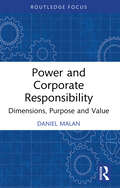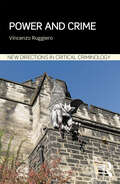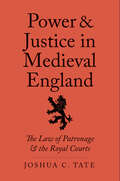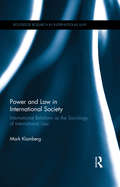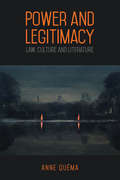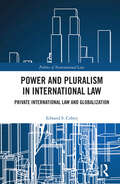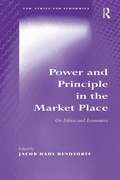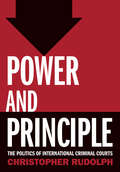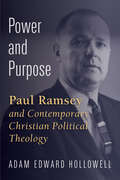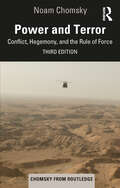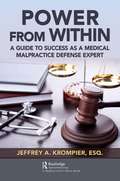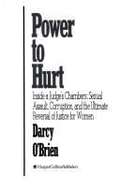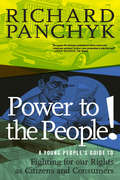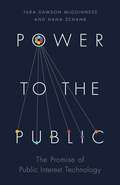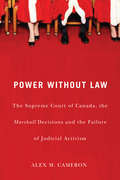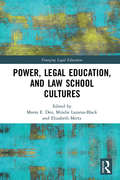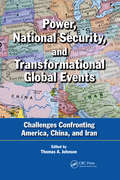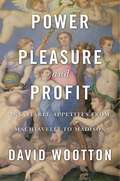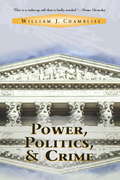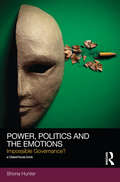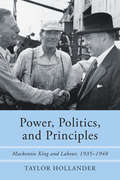- Table View
- List View
Power and Corporate Responsibility: Dimensions, Purpose and Value (Routledge CoBS Focus on Responsible Business)
by Daniel MalanPower and Corporate Responsibility explores the concept of corporate responsibility and offers a systematic discussion by referring to the following dimensions: understanding responsibility, taking responsibility, governing responsibility, managing responsibility, investing in responsibility, reporting on responsibility and regulating responsibility. The aim of the book is to provide a user-friendly but theoretically grounded overview of the core dimensions of CR. The seven dimensions of CR are not offered as a definitive framework, but rather a flexible conceptual framework that is compatible with acknowledged thought leadership in the field. The author uses his diverse academic background, as well as his practitioner background, to debunk some of the myths associated with CSR using mini case studies, but also to illustrate the strategic importance of the concept of CR. This accessible book will be a valuable resource for business management scholars, instructors and upper-level students, and those with a particular interest in business ethics, CSR and corporate governance. It will also serve as a guide for participants in executive education courses.
Power and Crime (New Directions in Critical Criminology)
by Vincenzo RuggieroThis book provides an analysis of the two concepts of power and crime and posits that criminologists can learn more about these concepts by incorporating ideas from disciplines outside of criminology. Although arguably a 'rendezvous' discipline, Vincenzo Ruggiero argues that criminology can gain much insight from other fields such as the political sciences, ethics, social theory, critical legal studies, economic theory, and classical literature. In this book Ruggiero offers an authoritative synthesis of a range of intellectual conceptions of crime and power, drawing on the works and theories of classical, as well as contemporary thinkers, in the above fields of knowledge, arguing that criminology can ‘humbly’ renounce claims to intellectual independence and adopt notions and perspectives from other disciplines. The theories presented locate the crimes of the powerful in different disciplinary contexts and make the book essential reading for academics and students involved in the study of criminology, sociology, law, politics and philosophy.
Power and Justice in Medieval England: The Law of Patronage and the Royal Courts (Yale Law Library Series in Legal History and Reference)
by Joshua C. TateHow the medieval right to appoint a parson helped give birth to English common law Appointing a parson to the local church following a vacancy—an &“advowson&”—was one of the most important rights in medieval England. The king, the monasteries, and local landowners all wanted to control advowsons because they meant political, social, and economic influence. The question of law turned on who had the superior legal claim to the vacancy—which was a type of property—at the time the position needed to be filled. In tracing how these conflicts were resolved, Joshua C. Tate takes a sharply different view from that of historians who focus only on questions of land ownership, and he shows that the English needed new legal contours to address the questions of ownership and possession that arose from these disputes. Tate argues that the innovations made necessary by advowson law helped give birth to modern common law and common law courts.
Power and Law in International Society: International Relations as the Sociology of International Law (Routledge Research in International Law)
by Mark KlambergWhen studying international law there is often a risk of focusing entirely on the content of international rules (i.e. regimes), and ignoring why these regimes exist and to what extent the rules affect state behavior. Similarly, international relations studies can focus so much on theories based on the distribution of power among states that it overlooks the existence and relevance of the rules of international law. Both approaches hold their dangers. The overlooking of international relations risk assuming that states actually follow international law, and discounting the specific rules of international law makes it difficult for readers to understand the impact of the rules in more than a superficial manner. This book unifies international law and international relations by exploring how international law and its institutions may be relevant and influence the course of international relations in international trade, protection of the environment, human rights, international criminal justice and the use of force. As a study on the intersection of power and law, this book will be of great interest and use to scholars and students of international law, international relations, political science, international trade, and conflict resolution.
Power and Legitimacy
by Anne QuémaAn interdisciplinary analysis of the ways in which symbolic acts create social norms, Power and Legitimacy is an important contribution to the growing body of scholarship on law and literature. Drawing on the theoretical insights of Judith Butler and Pierre Bourdieu, Anne Quéma demonstrates the effect of symbolic violence on the creation of social and political legitimacy.Examining modern jurisprudence theory, statutory law, and the family within the modern Gothic novel, Quéma shows how the forms and effects of political power transform as one shifts from discourse to discourse. An impressive integration of the scholarship in these three fields, Power and Legitimacy is a thought-provoking analysis of the basis of power and the law.
Power and Pluralism in International Law: Private International Law and Globalization (Politics of Transnational Law)
by Edward S. CohenDemonstrating the crucial role that private international law and legality has played and continues to play in shaping globalization, this book argues that the rules, institutions, and actors that make up the practice of private international law have been critical in translating political and economic power into legal regimes that have facilitated the processes of globalization. These processes depend on two fundamental types of socio-political action – the legal structuring of emerging transnational spaces and flows of goods, capital, and finance, and the legal-political reconfiguration of state power and priorities to facilitate the growth of these spaces and their penetration into national political-economic-and social spaces. While a variety of processes were involved in these forms of action, the material practices of private international law played a central role in this project of political economic reconstruction. Offering a theory of private international legality as a practice that intersects with and provides a vehicle for the mobilization of political and economic power, this book examines the construction and enrolment of private law expertise and the structural condition of pluralism in the global political economy to argue that private international law has helped construct a global political economy responsive to the priorities of powerful actors and resistant to the demands and interests of the rest of the world’s populations. It will be of interest to academics and students exploring the relationship between law, international political economy and the nature of state power.
Power and Principle in the Market Place: On Ethics and Economics (Law, Ethics And Economics Ser.)
by Jacob Dahl RendtorffIn the global financial crisis, the need to develop a new kind of economy with a closer relation between ethics and economics has become an important challenge to the international society. This book contributes to this debate by investigating different aspects of global business ethics and corporate social responsibility which are becoming more and more important in the ongoing discussions on the relation between market institutions and democratic governments. The different chapters of the book deal with fundamental philosophical issues of the ethics of the market economy, including discussions of the role of the social sciences and economics in contributing to a sustainable economics and global responsibility in the twenty-first century. In this sense, the book takes up the transnational debate on ethics and economics in order to contribute to a more balanced, fair, just and conscientious development in the world. The book starts with a European perspective on these issues, based on philosophical, sociological and economic views from Europe. These views are further developed in order to share thoughts of how to improve corporate social responsibility, welfare and justice, and the advancement of ethical principles in the international context. It is argued that in the international community, good corporate citizenship as social and environmental responsibility is realized through individual and organizational cosmopolitan responsibility for fostering the common good for humanity. The chapters of the book were originally presented at a conference in Copenhagen, organized together with the German Cultural Institute - the Goethe Institute of Copenhagen, Copenhagen Business School and Roskilde University, Denmark.
Power and Principle: The Politics of International Criminal Courts
by Christopher RudolphOn August 21, 2013, chemical weapons were unleashed on the civilian population in Syria, killing another 1,400 people in a civil war that had already claimed the lives of more than 140,000. As is all too often the case, the innocent found themselves victims of a violent struggle for political power. Such events are why human rights activists have long pressed for institutions such as the International Criminal Court (ICC) to investigate and prosecute some of the world’s most severe crimes: genocide, war crimes, and crimes against humanity.While proponents extol the creation of the ICC as a transformative victory for principles of international humanitarian law, critics have often characterized it as either irrelevant or dangerous in a world dominated by power politics. Christopher Rudolph argues in Power and Principle that both perspectives are extreme. In contrast to prevailing scholarship, he shows how the interplay between power politics and international humanitarian law have shaped the institutional development of international criminal courts from Nuremberg to the ICC. Rudolph identifies the factors that drove the creation of international criminal courts, explains the politics behind their institutional design, and investigates the behavior of the ICC. Through the development and empirical testing of several theoretical frameworks, Power and Principle helps us better understand the factors that resulted in the emergence of international criminal courts and helps us determine the broader implications of their presence in society.
Power and Purpose: Paul Ramsey and Contemporary Christian Political Theology
by Adam Edward HollowellNot long ago, Paul Ramsey (1913-1988) was a leading voice in North American Christian ethics. Today, however, his intellectual legacy is in question, and his work is largely ignored by current scholars in the field. Against the tide of that neglect, Adam Edward Hollowell argues in Power and Purpose that Ramsey's work can still yield considerable insight for contemporary Christian political theology.Hollowell shows the influences of Jean-Jacques Rousseau and Karl Barth on Ramsey's early work; discusses his conversations with political theologians of his generation, including Reinhold and Richard Niebuhr and Joseph Fletcher; considers his influence on the early virtue theory of Jean Porter and Oliver O'Donovan; and places Ramsey's work in conversation with more recent voices in Christian ethics, including John Bowlin, Jennifer Herdt, Charles Mathewes, Eric Gregory, and Daniel Bell. Hollowell thus forges new connections between Ramsey and contemporary debates in political theology on such issues as political authority, power, just war, and torture.Hollowell's Power and Purpose also revisits well-known aspects of Ramsey's work -- for example, his insistence on the political significance of God's covenant with creation -- and offers an original account of the role of judgment in his theology of repentance. The book dedicates considerable attention to Ramsey's description of practical reasoning and highlights his commitment to the virtues, especially prudence. This accessible introduction to Paul Ramsey will appeal to a wide swath of scholars and students in Christian ethics and political theology.
Power and Terror: Conflict, Hegemony, and the Rule of Force (Chomsky from Routledge)
by Noam ChomskyIn this pertinent book, Noam Chomsky examines the imbalanced dynamics of international power relations and the use of state terror by the United States and other Western powers in the Middle East in the post-9/11 era. This edition features new forewords by Fred Branfman and Chris Hedges reasserting the enduring importance of Chomsky’s work and extending Chomsky’s analysis to recent developments in the Middle East.Chomsky explores international relations since World War II to demonstrate that contemporary acts of terrorism cannot be understood outside the context of Western power and state terror throughout the world, particularly in the Middle East. In doing so, Chomsky demonstrates that state terror is intrinsic to U.S. foreign policy and fundamental in the maintenance of Western hegemony throughout the so-called War on Terror, including throughout the Obama administration.This new edition offers a vital critique of U.S. foreign policy and its reliance on acts of terror to maintain its hegemony in the Middle East. It will therefore be vital reading for those who wish to understand the grim realities of Western foreign policy.
Power from Within: A Guide to Success as a Medical Malpractice Defense Expert
by Jeffrey A. Krompier, Esq.There is no end in sight to the frequency with which physicians, nursing professionals and other healthcare providers will become lawsuit targets in our litigious society. While politicians, practitioners, insurance companies and trial attorneys debate the nation’s chronic "malpractice crisis", suits continue to be filed. In addition, once COVID-19 is behind us and the unprecedented public support for health care providers wanes, as it will, it is anticipated that physicians and nurses will become malpractice defendants to a remarkable degree. National legislative fact-finding committees and investigative bodies, which may be charged with the responsibility of pursuing a solution, likely will never achieve a global remedy. Although curtailed by some states, national legislation has not addressed baseless malpractice suites or grossly excessive monetary verdicts. Another approach exists, however. Health care providers can impact the existing system and influence the malpractice environments in a tangible, positive and powerful fashion. Although there will be debate over tort reform in order to bring some degree of protection to the malpractice defendant, individual case success, defined from the defendant’s perspective as a "no-cause" trial verdict, can be realized if well-credentialed and experienced health care professionals are willing to assist the malpractice defense bar as expert witnesses. The benefits to the health care community and the individuals who are willing to participate are innumerable and worth considering.
Power to Hurt
by Darcy O'Brien"His was a sensibility in which sex, hate, and the lust for power were so intertwined as to be indistinguishable." Are you in the mood for reading about a real-life villain whose abuse of power was compared to that of Henry VIII? Look no further than this small community in West Tennessee, where a detestable judge used his influence over jobs and child custody cases to intimidate several women into a state of sexual victimization and emotional paralysis. Darcy O'Brien's writing is eloquently descriptive, with a good feeling for character--such as the heroic, yet humble, figure of an FBI agent who cares enough about the community to involve himself in local problems and bring the judge to trial. Power to Hurt is nominated for a 1997 Edgar Award.
Power to the People!: A Young People's Guide to Fighting for Our Rights as Citizens and Consumers (For Young People Series)
by Richard PanchykAn important and empowering history of and guide to the battle for our right to safe products and conditions--for younger readers.Corporations enter our daily lives from the moment we wake up until we turn off the lights at night. Large Internet companies, health insurance companies, fuel and transportation companies--all play a role in our lives every moment of every single day. And yet what power do we have over their actions or intentions? None, except through redress in a court of law for any harm they may have done. This area of the law is known as torts, from the French word for wrongs.Power to the People! offers a deep understanding of how civil actions work, through many examples and straightforward language for the middle-grade student reader. From Ralph Nader's 1966 law-changing address to Congress on automobile safety (it's thanks to Nader that we wear seat belts) to the decades-long battle to raise awareness of the risks of smoking (cigarette and cigar smoke contains over 7,000 chemicals, and has caused the deaths of more than 2.5 million nonsmokers in the last half-century), readers will learn how we must fight to protect ourselves from corporations that are more concerned with profit than our safety. Corporate America will listen, Panchyk argues, but only if we make ourselves heard. Power to the People! explores all the ways we the people can be powerful, too.
Power to the Public: The Promise of Public Interest Technology
by Hana Schank Tara Dawson McGuinnessA powerful new blueprint for how governments and nonprofits can harness the power of digital technology to help solve the most serious problems of the twenty-first centuryAs the speed and complexity of the world increases, governments and nonprofit organizations need new ways to effectively tackle the critical challenges of our time—from pandemics and global warming to social media warfare. In Power to the Public, Tara Dawson McGuinness and Hana Schank describe a revolutionary new approach—public interest technology—that has the potential to transform the way governments and nonprofits around the world solve problems. Through inspiring stories about successful projects ranging from a texting service for teenagers in crisis to a streamlined foster care system, the authors show how public interest technology can make the delivery of services to the public more effective and efficient.At its heart, public interest technology means putting users at the center of the policymaking process, using data and metrics in a smart way, and running small experiments and pilot programs before scaling up. And while this approach may well involve the innovative use of digital technology, technology alone is no panacea—and some of the best solutions may even be decidedly low-tech.Clear-eyed yet profoundly optimistic, Power to the Public presents a powerful blueprint for how government and nonprofits can help solve society’s most serious problems.
Power without Law
by Alex M. CameronIn Power without Law Alex Cameron enlivens the debate over judicial activism with an unprecedented examination of the details of the Marshall case, analyzing the evidence and procedure in the trial court and tracing the legal arguments through the Court of Appeal to the Supreme Court of Canada. He argues that there were critical defects in the process - the successful argument at the Supreme Court of Canada was never tested in the lower courts, the Crown's expert was precluded from testifying about a vital document, the Court's analysis does not accord with the historical evidence, and the treaty rights are inconsistent with the colonial law of Nova Scotia.
Power without Law: The Supreme Court of Canada, the Marshall Decisions and the Failure of Judicial Activism
by Alex M. CameronThe Supreme Court of Canada decision in the Marshall case asserted sweeping Native treaty rights and generated intense controversy. In Power without Law Alex Cameron enlivens the debate over judicial activism with an unprecedented examination of the details of the Marshall case, analyzing the evidence and procedure in the trial court and tracing the legal arguments through the Court of Appeal to the Supreme Court of Canada. He argues that there were critical defects in the process - the successful argument at the Supreme Court of Canada was never tested in the lower courts, the Crown's expert was precluded from testifying about a vital document, the Court's analysis does not accord with the historical evidence, and the treaty rights are inconsistent with the colonial law of Nova Scotia. Concluding that the Marshall decision was the result of incautious judicial activism, Power without Law challenges us to reconsider the role of our courts in the Charter era.
Power, Justice, and the Environment: A Critical Appraisal of the Environmental Justice Movement
by David Naguib Pellow Robert J. BrulleThis book provides a critical appraisal, examining EJM's tactics and strategies, rhetoric, organizational structure, and resource base. With chapters by both scholars and activists, the book links theory and practice with the aim of contributing to a more effective movement.
Power, Law and the End of Privateering
by Jan Martin LemnitzerThis book offers an exciting new take on the relationship between law and power. The 1856 Declaration of Paris marks the precise moment when international law became universal, and was an aggressive and successful British move to end privateering forever - then the United States' main weapon in case of war with Britain.
Power, Legal Education, and Law School Cultures (Emerging Legal Education)
by Elizabeth Mertz Meera E. Deo Mindie Lazarus-BlackThere is a myth that lingers around legal education in many democracies. That myth would have us believe that law students are admitted and then succeed based on raw merit, and that law schools are neutral settings in which professors (also selected and promoted based on merit) use their expertise to train those students to become lawyers. Based on original, empirical research, this book investigates this myth from myriad perspectives, diverse settings, and in different nations, revealing that hierarchies of power and cultural norms shape and maintain inequities in legal education. Embedded within law school cultures are assumptions that also stymie efforts at reform. The book examines hidden pedagogical messages, showing how presumptions about theory’s relation to practice are refracted through the obfuscating lens of curricula. The contributors also tackle questions of class and market as they affect law training. Finally, this collection examines how structural barriers replicate injustice even within institutions representing themselves as democratic and open, revealing common dynamics across cultural and institutional forms. The chapters speak to similar issues and to one another about the influence of context, images of law and lawyers, the political economy of legal education, and the agency of students and faculty.
Power, National Security, and Transformational Global Events: Challenges Confronting America, China, and Iran
by Thomas A. JohnsonAs the United States struggled to survive the recent recession, China quietly acquired a vast amount of U.S. Treasury bills and bonds. With China now holding so much of America‘s debt, currency valuation issues have already caused tensions between the two superpowers. Couple this with Iran‘s efforts to develop into a nuclear power in an area that l
Power, Pleasure, and Profit: Insatiable Appetities from Machiavelli to Madison
by David WoottonDavid Wootton guides us through four centuries of Western thought to show how new ideas about politics, ethics, and economics stepped into a gap opened up by religious conflict and the Scientific Revolution. As ideas about godliness and Aristotelian virtue faded, theories about the rational pursuit of power, pleasure, and profit moved to the fore.
Power, Politics And Crime
by William J ChamblissIn the United States today, we are on the verge of fulfilling a nightmare scenario. Parents are fearful of letting their children play in their own yards and elderly people are afraid to leave their homes. The bogeyman in this rampant panic about crime is the young black male, who, in the media and public image, is a "superpredator” lurking on every street corner ready to attack any prey that is vulnerable. But is crime in America really as bad as the public has been made to believe?Power, Politics, and Crime argues that the current panic over crime has been manufactured by the media, law enforcement bureaucracies, and the private prison industry. It shows how the definition of criminal behavior systematically singles out the inner-city African American. But urban minorities aren’t the only victims. Although crime rates have been declining for 25 years, vast amounts of money pour into the criminal justice-industrial complex, diverting scarce resources from other social services such as education, social welfare, and health care. While in recent years downsizing has affected almost every segment of the public sector, the criminal justice bureaucracies have seen an unprecedented expansion. Through ethnographic observations, analysis of census data, and historical research, William Chambliss describes what is happening, why it has come about, and what can be done about it. He explores the genesis of crime as a political issue, and the effect that crime policies have had on different segments of the population. The book is more than a statement about the politics of crime and punishment--it’s a powerful indictment of contemporary law enforcement practices in the United States. In addition to updating the data the author has added a discussion of the "declining crime rate. " Contrary to presentations in the media and by law enforcement agencies, the rate has been declining for over 25 years and therefore cannot be attributed to any "get tough on crime" policies so dear to the hearts of prosecutors and politicians. Chapter Seven, "Crime Myths and Smokescreens" has been completely revised and updated. Updates include a discussion of the recent scandal in the Los Angeles Police Department which has resulted in criminal charges against police officers and the release of numerous convicted felons because of falsified evidence and testimony on the part of police officers. The attack on Louima in the police station in New York as well as the shooting of Diallo are discussed in some detail as well as other recent exposures of police brutality and corruption. The sections on white collar, corporate, and state crimes have been updated and recent examples added to the text.
Power, Politics and the Emotions: Impossible Governance? (Social Justice)
by Shona HunterHow can we rethink ideas of policy failure to consider its paradoxes and contradictions as a starting point for more hopeful democratic encounters? Offering a provocative and innovative theorisation of governance as relational politics, the central argument of Power, Politics and the Emotions is that there are sets of affective dynamics which complicate the already materially and symbolically contested terrain of policy-making. This relational politics is Shona Hunter’s starting point for a more hopeful, but realistic understanding of the limits and possibilities enacted through contemporary governing processes. Through this idea Hunter prioritises the everyday lived enactments of policy as a means to understand the state as a more differentiated and changeable entity than is often allowed for in current critiques of neoliberalism. But Hunter reminds us that focusing on lived realities demands a melancholic confrontation with pain, and the risks of social and physical death and violence lived through the contemporary neoliberal state. This is a state characterised by the ascendency of neoliberal whiteness; a state where no one is innocent and we are all responsible for the multiple intersecting exclusionary practices creating its unequal social orderings. The only way to struggle through the central paradox of governance to produce something different is to accept this troubling interdependence between resistance and reproduction and between hope and loss. Analysing the everyday processes of this relational politics through original empirical studies in health, social care and education the book develops an innovative interdisciplinary theoretical synthesis which engages with and extends work in political science, cultural theory, critical race and feminist analysis, critical psychoanalysis and post-material sociology.
Power, Politics, and Paranoia
by Jan-Willem van Prooijen Paul A. M. van LangePowerful societal leaders - such as politicians and Chief Executives - are frequently met with substantial distrust by the public. But why are people so suspicious of their leaders? One possibility is that 'power corrupts', and therefore people are right in their reservations. Indeed, there are numerous examples of unethical leadership, even at the highest level, as the Watergate and Enron scandals clearly illustrate. Another possibility is that people are unjustifiably paranoid, as underscored by some of the rather far-fetched conspiracy theories that are endorsed by a surprisingly large portion of citizens. Are societal power holders more likely than the average citizen to display unethical behaviour? How do people generally think and feel about politicians? How do paranoia and conspiracy beliefs about societal power holders originate? In this book, prominent scholars address these intriguing questions and illuminate the many facets of the relations between power, politics and paranoia.
Power, Politics, and Principles: Mackenzie King and Labour, 1935-1948 (G - Reference, Information and Interdisciplinary Subjects)
by Taylor HollanderSet against the backdrop of the U.S. experience, Power, Politics, and Principles uses a transnational perspective to understand the passage and long term implications of a pivotal labour law in Canada. Utilizing a wide array of primary materials and secondary sources, Hollander gets to the root of the policy-making process, revealing how the making of P.C. 1003 in 1944, a wartime order that forced employers to the collective bargaining table, involved real people with conflicting personalities and competing agendas. Each chapter of Power, Politics, and Principles begins with a quasi-fictional vignette to help the reader visualize historical context. Hollander pays particular attention to the central role that Mackenzie King played in the creation of P.C. 1003. Although most scholars describe the Prime Minister’s approach to policy decisions as calculating and opportunistic, Power, Politics, and Principles argues that Mackenzie King’s adherence to moderate principles resulted in a less hostile legal environment in Canada for workers and their unions in the long run, than a more far-reaching collective bargaining law in the United States.
